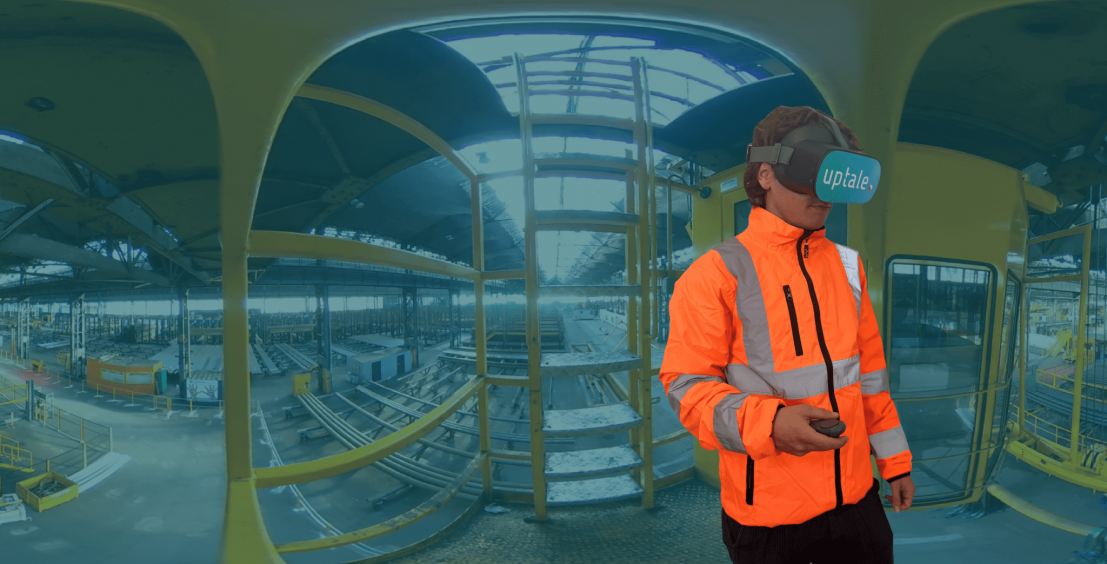More than a 100 companies are already using the Uptale solution to be freed from physical constraints and train frontline workers with Virtual Reality. Training of operational teams, onboarding of newcomers, deployment of production, quality and safety standards are all training modules that can be deployed for operators in the industrial sector. Let’s take a look at the operating procedures of the companies that train them with Théo Souris, International Sales Manager at Uptale.
Field training at Digital Speed
One of the major problems that arises when we talk about field training involves logistics. In order to best prepare frontline workers for their daily tasks, “traditional training methods are ultimately very limiting,” Théo points out. Indeed, each training requires the training personnel to commute, the use of specific safety and protection equipment and sometimes even requires stopping the machines on the production line.
That’s why we enable customers who use the Uptale solution to digitize the field thanks to 360° pictures and videos and to add a layer of interactions (manipulations, quizzes, speaking, detection). In these conditions, “the learner increases their skills in the complete safety of virtual reality” and the logistical constraints are drastically reduced: less personnel to move, less equipment to mobilize and less machines to stop. This saves a significant amount of time to train in real-life situations.

A significant solution for all stages of training
For Théo, with Uptale “we do not replace a training course in a company“. Rather, it is a matter of “using the solution in a complementary way to other types of training” such as e-learning modules, training directly on the workstation, in a tutored way or in complete autonomy. And the objective is twofold, because it is also necessary “to be able to integrate VR into each stage of the training of a frontline operator, namely arrival at the position, taking up the position and the routine operation“.
A redesigned user experience
Uptale is first and foremost a solution that can be used by everyone in the company based on their assigned roles. “You don’t need to be an IT engineer to create a training course and deliver it with Uptale. There are also trainers, business experts and in some cases frontline operators themselves.” The important thing is to clearly define the objectives and roles of everyone in the training process so that each module fits perfectly, is relevant, engaging and sustainable over time.
The frontline workers who have the role of learners can train directly on the Uptale platform with their access or find their modules on the LMS (Learning Management System) used by the company. Theo adds that these trainings can be done “on any type of support such as phone, tablet, computer and of course all virtual reality headsets on the market, for a total immersion“.
Between support and complete autonomy
There are several key stages in the start-up and use of a solution like Uptale. For the new companies that join the Immersive Learning movement, there is, first of all, continuous support by the Uptale teams in order to frame the project as well as possible. As in any project management, the first step is “to ensure that the needs are clearly expressed and understood by all stakeholders”:
- Kick-off – The right questions need to be asked here and, above all, a training module needs to be designed for which virtual reality will have meaning and real added value.
- Storyboarding – Uptale’s educational teams work hand in hand with the company’s business experts to script the training.
- Filming – This is when the 360° photos and videos are taken with the cameras and the storyboard comes to life.
- Integration – once the environment has been digitized, the support continues directly with the use of the Uptale creation tool, the integration of content and the interactive overlay.
- Deployment and analysis – deploying the solution on different media and analyzing the results and feedback from frontline workers. This is an essential step that is part of a continuous learning philosophy.
Finally, Théo concludes, “once the solution is in the hands of the competent teams, it’s time to use it independently.” Customers can now create, distribute and analyze training courses by themselves for frontline workers, while knowing that a dedicated team of Account Managers, educational and technical teams will provide tailored support in order to imagine ever more immersive modules, to gain in speed of creation and to reach even more learners on production sites.
Interested in training frontline workers?
Book a meeting today

